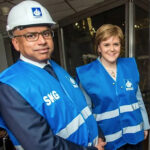FOR MANY YEARS now I have done the odd bit of media engagement, with occasional radio and tv interviews from time to time, plus some articles in the papers when asked. It was always more of a hobby or pastime than it was ever a job, and I was perfectly content to give various outlets my views on defence (being an ex-army officer) and Scottish politics, with a little bit of social commentary thrown in from time to time.
That all changed dramatically come February 2022, when Russia invaded Ukraine (for the second time if we’re being accurate, after their annexation of Crimea in 2014). Suddenly everybody wanted a military commentator – CNN, NBC, BBC, Daily Mail, Daily Express, Times Radio, LBC – you name it. And military pundits were few and far between.
So they tracked me down, and to this day I’m not exactly sure how and why, but find me they did. And that’s when the fun really began.
Fast forward three and a half years and counting and it continues to be pretty all-consuming, with sometimes an interview/comment piece every second day, and sometimes a couple of each in the same day, driven by the news cycle.
Along the way I’ve had some pretty amusing experiences, with the odd near disaster narrowly avoided.
One of the first things I learned when I became more involved was that there is a whole new language and multiple acronyms to be mastered. When media folk first talked to me about doing a PTC (piece to camera) DTL (down the line, ie remotely by webcam) I was dumfounded. I didn’t have a clue what they were talking about.
And when one researcher asked me what my “will say” was I confessed that I didn’t have a Scooby Doo what she was talking about. Gently she explained that it was a précis of what I was going to say (duh, geddit?) when we went live. I felt such a dummy.
Then there was the assumption that I knew who everybody else was. When asked to appear on a GB News panel in their studio in Paddington during one of my increasingly rare forays south of the Border, I asked who else was appearing and was told “it’s Tom”, or “it’s Narinder”. Being a naïve wee laddie from rural Scotland I had no idea who these people might be, but Google is a wonderful thing and having researched them I found them both, and others, to be quite charming.
More challenging, perhaps, has been being booked to discuss one topic and then finding, on going live on air, that they’re going to ask you about a completely different topic altogether. This is a frequent occurrence. A classic was appearing on CNN in the early hours of the morning, having been asked to comment on one particular aspect of the Ukraine conflict, and then being quizzed by one of their correspondents on the ground in Crimea about a missile attack which was happening as we went live, and about which I had no clue.
Another aspect is the delightful young people who contact me and ask me to appear on whatever programme they’re working for. And I say young people because almost without exception they are, probably in their early to mid twenties as a rule.
They tend to be, almost without exception, middle class and privately educated. And why is that you may ask? Well, I think the answer is twofold. First and foremost, junior media jobs – runner, researcher, assistant producer – are infamously poorly paid. Second, many positions are freelance, with no guarantee of job or income security.
Against such a background, the young people who can run these risks tend to be those who have a family financial safety net, hence such posts being predominantly filled by the Torquils and Camillas, rather than the Ryans and Kylies. It’s not fair, but it is what it is.
I have had my fair share of near disasters. In the early days, when Newsnight Scotland was still a thing, I was interviewed by Iain McWhirter in the BBC’s Tun studios in Edinburgh. Mobile phones were still a bit of a novelty, and I was the proud possessor of one of the new fangled Motorola flip models, kindly given to me by their then factory in Bathgate.
My phone was in my coat pocket, which I threw over a nearby chair, and got wired up for the broadcast. Too late I remembered that my kids had been fooling around with the ringtones and had left me with a really embarrassing one, and that I had forgotten to switch the phone to silent. I spent the whole interview sweating that it was going to go off mid broadcast, which thankfully it didn’t, but that was an early lesson learned.
On a more recent occasion, again with the BBC, I was asked to appear at short notice in the evening, well after the drinks cabinet had been visited more than once, if you get my drift. But I thought I’d be OK, despite having just poured myself (another) large glass of wine, and went off to brush my hair and put on a jacket and tie.
One is always asked to dial in early and get camera and sound set up, which I duly did. Then, being told they would come to me in two minutes for the live broadcast, I continued with my glass of wine in the meantime. It was only just before “going live” that I realised I had been “live” all the time on the big screen behind the presenter’s desk! Calamity. I haven’t been asked back!
A final example. I was booked a few months ago for German state tv to comment on a military initiative just announced by the German Chancellor. The initiative had a code name and it sounded familiar to me – a plan for the air defence of eastern Ukraine. I knew a bit about it – so I thought – and did my usual due diligence research before going on air.
What I wasn’t aware of, though, was that the same code name had been given to an entirely separate and different project too, so was mildly taken aback when I was asked questions for a topic on which I had zero knowledge. I think I got away with it by massaging what I did know into the new topic, but my son who was watching said the dead giveaway – for him at least – was the slightly longer time it took me to start my answer, plus the slightly bemused and poorly disguised expression on my face.
Ho hum. All part and parcel of being a broadcast commentator, and I’m sure others have more and better tales to tell. My advice to those who might want to go down the same path? Always make sure you know exactly what the topic is, but also be up to speed with the other issues of the day in your particular field. The news changes with spectacular rapidity and the broadcaster may not have time to book someone else.
Oh, and try not to drink too much before going on air. Therein lies the road to disaster!
Established in 2006, ThinkScotland is not for profit (it makes a loss) and relies on donations to continue publishing our wide range of opinions – you can follow us on X here – like and comment on facebook here and support ThinkScotland by making a donation here.











